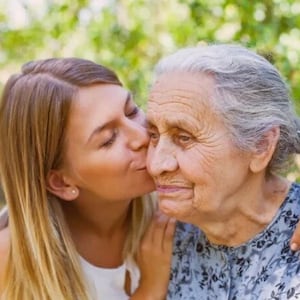Health
Understanding Dementia: Navigating the Journey of Living Loss

Dementia represents a complex and often unpredictable experience for those affected and their families. In a recent episode of the podcast The Little Things, best-selling author and award-winning academic Dr. Lucy Hone discussed the emotional toll of supporting a loved one dealing with cognitive decline. She describes this journey as one of “living loss,” a term that captures the ongoing grief experienced by caregivers as they confront the realities of dementia.
Dr. Hone emphasized that dementia is not a straightforward narrative with a clear beginning, middle, and end. Instead, it is characterized by what she calls a “non-finite loss.” This means that caregivers often cannot predict the pace or extent of changes that their loved ones will undergo. “You don’t know how long it’s going to last, you don’t know how quickly the demise is going to occur,” she explained. For those in this situation, uncertainty looms large, adding layers of emotional complexity to an already challenging experience.
Understanding the Emotional Impact
The concept of living loss is particularly poignant. It encompasses both tangible and intangible losses, including changes in personality, memory, and the ability to engage in previously enjoyed activities. Caregivers frequently find themselves mourning not just the person their loved one once was, but also the gradual fading of shared experiences and connections. This ongoing grief can often go unrecognized, leaving caregivers feeling isolated.
In discussing the nuances of dementia, Dr. Hone highlighted the need for greater awareness. “Many people do not understand what living loss truly means,” she noted. This lack of understanding can lead to further emotional strain on caregivers who might feel unsupported in their daily struggles.
The podcast also featured insights from hosts Louise Ayrey and Francesca Rudkin, who encouraged listeners to engage in open conversations about dementia and the feelings it evokes. They stressed the importance of acknowledging the emotional burden that comes with caring for someone experiencing cognitive decline.
Promoting Awareness and Support
Raising awareness about dementia and the concept of living loss is essential in fostering a supportive environment for caregivers. Resources and support groups can provide crucial assistance, but many individuals are unaware of the options available to them. Dr. Hone advocates for increased education on the emotional and psychological aspects of dementia care, emphasizing that understanding the condition can help caregivers navigate their journeys more effectively.
As society continues to grapple with the implications of an aging population, the conversation around dementia and living loss is becoming increasingly relevant. It is vital for communities to come together to provide support for those affected, ensuring that caregivers do not face their challenges alone.
The discussion on The Little Things serves as a reminder of the complexities surrounding dementia care. By opening up dialogue and sharing experiences, individuals can better understand the emotional landscape that caregivers navigate. Ultimately, fostering compassion and awareness can lead to a more supportive environment for both caregivers and those living with dementia.
-

 World5 months ago
World5 months agoTest Your Knowledge: Take the Herald’s Afternoon Quiz Today
-

 Sports5 months ago
Sports5 months agoPM Faces Backlash from Fans During Netball Trophy Ceremony
-

 Top Stories2 weeks ago
Top Stories2 weeks agoTongan Star Eli Katoa Shares Recovery Update After Surgery
-

 Lifestyle5 months ago
Lifestyle5 months agoDunedin Designers Win Top Award at Hokonui Fashion Event
-

 Entertainment5 months ago
Entertainment5 months agoExperience the Excitement of ‘Chief of War’ in Oʻahu
-

 Sports5 months ago
Sports5 months agoLiam Lawson Launches New Era for Racing Bulls with Strong Start
-

 World5 months ago
World5 months agoCoalition Forms to Preserve Māori Wards in Hawke’s Bay
-

 Health5 months ago
Health5 months agoWalking Faster Offers Major Health Benefits for Older Adults
-

 Lifestyle5 months ago
Lifestyle5 months agoDisney Fan Reveals Dress Code Tips for Park Visitors
-

 Politics5 months ago
Politics5 months agoScots Rally with Humor and Music to Protest Trump’s Visit
-

 Top Stories5 months ago
Top Stories5 months agoUK and India Finalize Trade Deal to Boost Economic Ties
-

 Health3 months ago
Health3 months agoRadio Host Jay-Jay Feeney’s Partner Secures Visa to Stay in NZ









